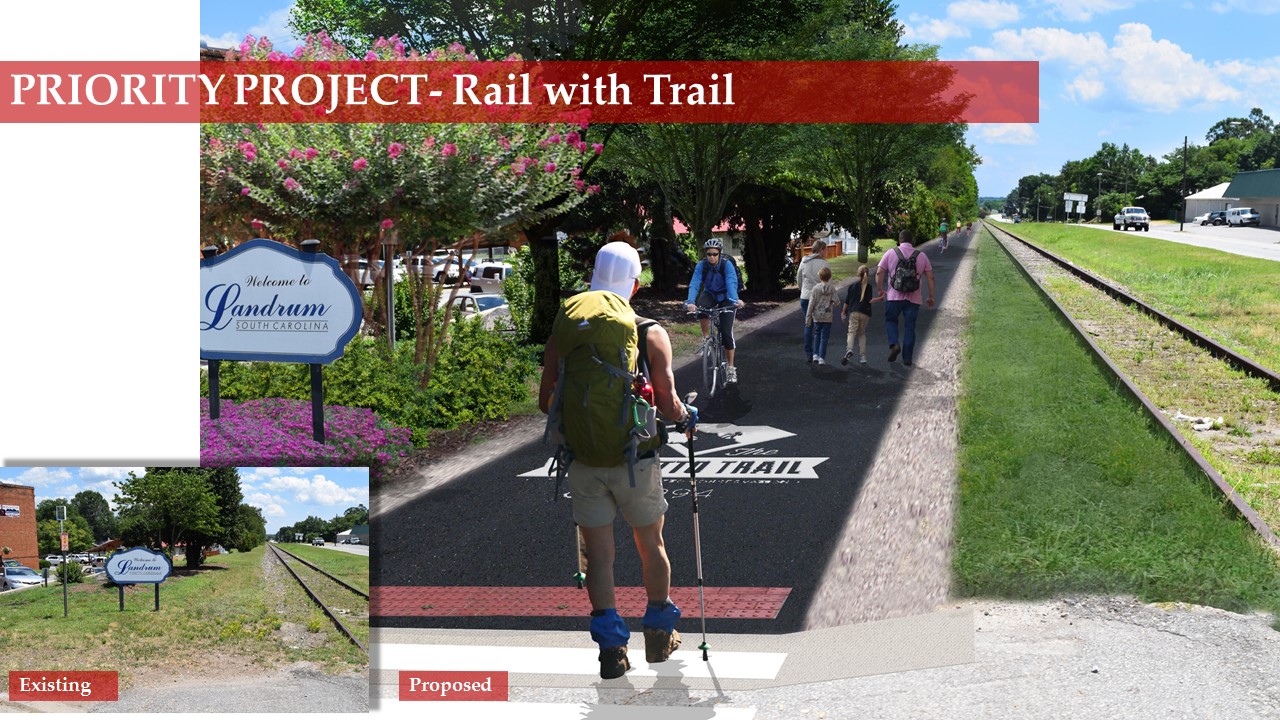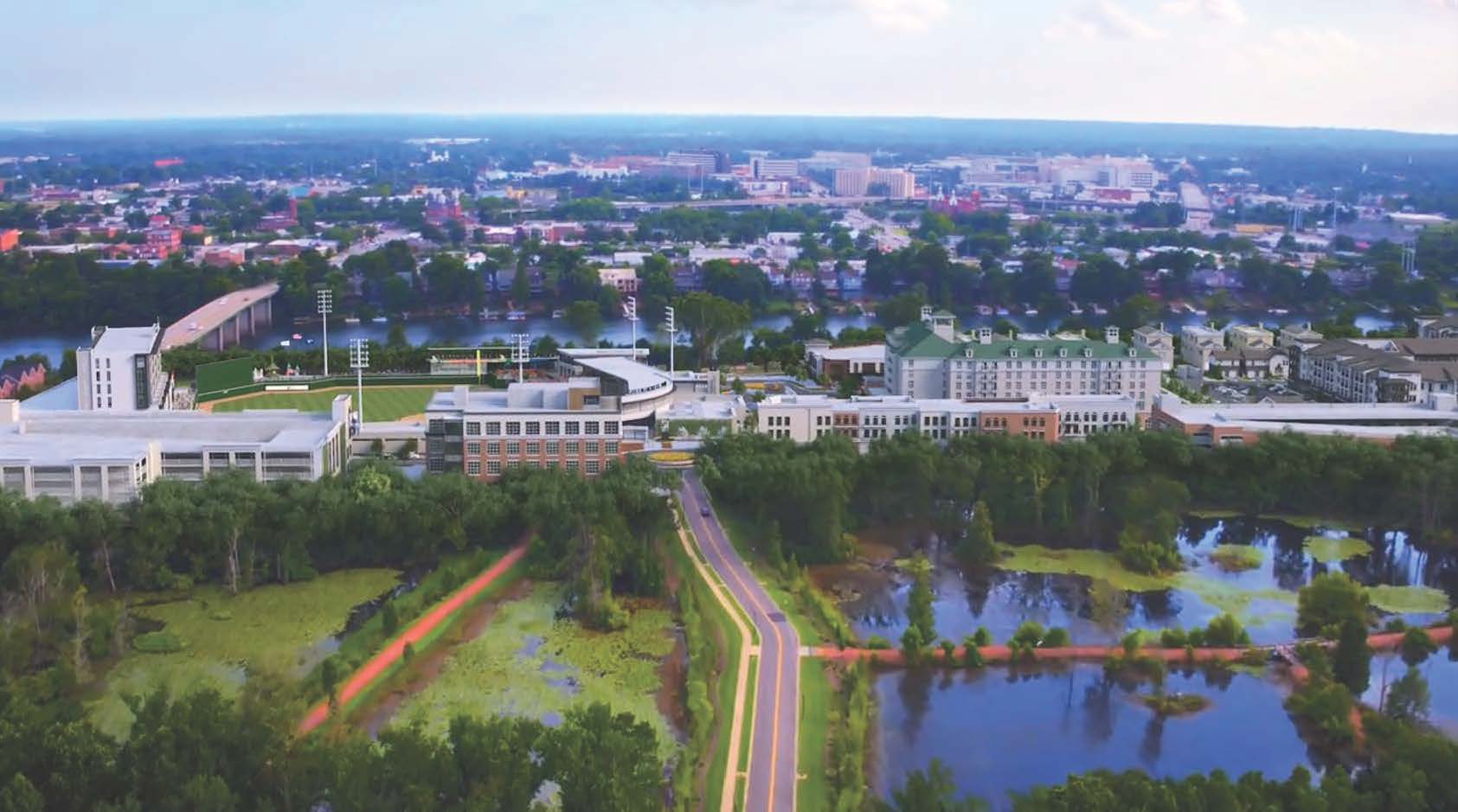For South Carolina cities and towns situated close to the Georgia or North Carolina border, competing, cooperating and managing growth is a way of life.
Making the most of high-growth cities over the state line has been a constant for the City of Landrum, which is part of two chambers of commerce — one representing Spartanburg County and another for the Carolina Foothills, which includes the North Carolina cities of Saluda, Tryon and Columbus.


A rendering of the future Landrum Rails to Trails (top). Plans include a connection between Landrum and Saluda, N.C. Landrum is the South Carolina town among the three North Carolina towns that are part of the Carolina Foothills Chamber of Commerce (bottom). Provided by: City of Landrum.
Landrum participates in some joint marketing efforts with its North Carolina neighbor towns, which all rely on tourism to some extent, said City Administrator Rich Caplan. In the same spirit, Landrum officials are in the planning stage of a rails-to-trail path that links Landrum, Saluda and Tryon.
Landrum enjoys another unique benefit from its location — Polk County, North Carolina, lies across the border from Landrum. A wealthy North Carolina benefactor to the area lived on a hill looking down over Landrum and Tryon. When she died, she bequeathed her money to the North Carolina foundation "plus Landrum," said Caplan, which means each year, Landrum receives some funds for its farmers market.
"Because of her view," he said, "she included us."
Caplan said the gas tax, which the Legislature raised by 2 cents in July — the first of six annual 2-cent hikes under the new law — remains lower than North Carolina's gas tax. This lower tax also provides an incentive for motorists to fill up on South Carolina's side of the border.
"If they stop to get gas, we have two large grocery stores and another business that are right next to the gas stations off Interstate 26," Caplan said.
Spillover growth
In the Town of Clover, Town Administrator Allison Harvey said the town is "absolutely" feeling the effects of growth from North Carolina municipalities.
"Especially because of our favorable residential taxes with Act 388, there are lots of people who move here for the more favorable property tax situation. But then they continue to work in North Carolina. We are definitely seeing that," she said.
"You are trying to provide for a way of life, but the very provision of it hurts that quality of life. So it's a challenge to find that balance of, 'We want to serve our residents, but we keep adding more to the mix.' So it's tough."
Although the City of York is 35 miles away from Charlotte, York City Manager Lisa Wallace said city officials are already preparing for the effects of the rapidly growing North Carolina city.
"We are seeing a lot of interest, which has started us focusing in on our infrastructure and things we can hopefully put in place now before the growth starts heading our way," she said. "We're currently working on a strategic plan and our comprehensive plan, but mainly it's water and sewer and infrastructure, because we are lacking in that in a lot of ways."
The City of North Augusta relies heavily on a strong Augusta, Georgia, to thrive, said North Augusta City Administrator Todd Glover.
"The Augusta GreenJackets minor league baseball team moving to North Augusta was not seen as competition," said Glover. "The addition of a stadium on our riverfront benefits downtown Augusta as well. Our two cities had to get away from the mindset of the river as a wall and think of it as Main Street."
The Georgia Cyber Innovation and Training Center is planned for construction near the U.S. Army's Cyber Command headquarters in Augusta, and the U.S. Army announced it would relocate the Army Cyber Command unit from Fort Belvoir, Virginia, to Fort Gordon in Augusta.
That promises big ripples into North Augusta.

A rendering of the future Riverside Village and Augusta GreenJackets stadium in North Augusta shows the City of Augusta, Georgia, in the background across the Savannah River. Provided by: North Augusta.
"The growth generated by Cyber Command moving to Fort Gordon will provide an excellent opportunity for us to share in the 'wealth,' as we are close enough in proximity for some of the cyber companies to locate," said Glover. "While both sides have unique amenities and different strengths and weaknesses, we are much stronger when businesses and visitors look at us regionally rather than singularly."
That philosophy is evident in Landrum, where the popularity of the Tryon International Equestrian Center — about 12 miles away — and the World Equestrian Games coming in September of 2018 are already being felt in Landrum.
"There are three ways to get to the center, and one way is if you're coming from Greenville, Spartanburg or Columbia, you'll get off the interstate at Landrum, so we are definitely affected by that," said Caplan. "Because of the center's activities, we have a lot of businesses that are benefiting from selling equestrian gear and equestrian clothing, and restaurants, too."
He said the equestrian influence of the region is drawing people from all over the northeast and southeast. That includes new residents.
"I met a woman recently on the North Carolina side who moved here from New York because they like horses," said Caplan.
Compete in your niche
While outdoor recreation and sports, such as equestrian events, can define a city's niche, so, too, can small-town charm.
Although Clover is considered a bedroom community of Charlotte, which is about 30 miles away, Harvey doesn't see Charlotte as competition.
"We compete with other communities in North Carolina for companies that are looking for a more rural location, because not all companies need or want to be on the interstate," said Harvey. "The small-town quality of life is what these businesses are looking for."
A strong school district, low crime, parks and recreation programming, cultural activities and rural appeal help Clover attract residents.
Clover has found success with small, family-owned companies of about 20 employees or less.
"That is really our niche market," she said. "We're competing with Shelby, North Carolina, and Kings Mountain, North Carolina."
Because of a shortage of employment opportunities in Clover, Harvey said the local workforce journeys north. But recent examples suggest local workers don't usually want to.
In the last two years, Harvey has interviewed a handful of job candidates for town administrative positions. Most of the candidates said they lived in Clover but commuted to Charlotte for work. They wanted to work for the Town of Clover in part, so they could work where they live.
"We have some really solid businesses here," she said. "But we need more."
